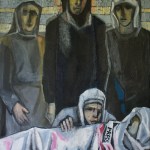

However, in private as in public life alike, the mass media preferred to say a lot regarding some passing headaches, whereas they kept silent about signs of a malignancy which was making itself evident within the body. I am referring to the feeling of rebellion among Arab citizens of Israel as their inequality before Israeli law in everything relating to land becomes clear. It has become known that some attempts have recently been made by the authorities to carry out orders for expropriation of land belonging to Arab citizens of Israel. Such an attempt is connected with the notorious “Area 9”.
There were also rumors that it was intended to carry out further massive expropriations in a number of villages in the Galilee, including Druze villages. The subject was discussed on television very superficially and the viewers could get the impression that the subject matter was a slight difference of opinion in semantics between the Adviser of Arab Affairs, S. Toledano, and some undefined entity, in whose direction the Adviser voiced some annoyed chirping from which it was possible to understand that the man was not quite at peace with something and it was not clear why.
The simple citizen, who during those days was occupied with the jundef affair, could not have imagined that this concerned a real storm which would rock the State. No-one brought to his attention that the agitation in the Arab villages in anticipation of the impending expropriations was spreading and embracing young and old. Secular and religious, supporters of both the Labour Party and the Communist Party. No-one informed the Israeli citizen that the threat of expropriation hand this time fallen on different ground than before, and that the fear of expropriation and the rebellion against it had for some months been creating a very significant change among the Arab citizens of Israel.

If the Israeli television had done its duty properly the complacent citizen would have been shocked to discover that the danger of loss of land was bringing about a better understanding between young and old in the Arab villages with the accompanying ingredients of the awakening of a strong self-identity: at assemblies which have recently taken place in some Arab villages folk-poets appeared who performed folklore songs with the audience answering in chorus. My Arab friends, who explained this phenomenon to me, said that they themselves were amazed at the magnitude of these events.
The matter has another facet, more serious and bearing more responsibility: when one hears the Head of the Kfar Kassem Council, Ismail Buder, the head of Arrabeh Council, Mahmoud Na’amna, or Farhoud Farhoud, a Druze notable, when one hears the exact explanations and the facts from the mouth of Sabri Khouri, and it transpires that background of the fierce opposition and the rebellion which may erupt in expectation of attempts to expropriate land is very complex but at the same them quite simple.
When one listens to these people one suddenly grasps the simplicity of the matter. These are Israeli citizens with an awareness of belonging to the land and the State, Israeli citizens who do not have nor have any reason for any inferiority complex as regards other citizens for they contribute to its life, economy and security not less than a banker from Shikun Bavli or a managing-director from Ramat Eshkol, and they simply demand that the same law which protects the lands of a moshavnik of Beer-Tuvia should also protect their lands.
Whoever is of the opinion that this demand is impertinent is obliged to declare that an ex-soldier from Yarka or a farmer from Arrabeh are second-class citizens of the State of Israel, citizen whose rights are similar to the rights and status of Jews in countries where Jews are kept in a status of “tolerated and second-class citizens”. Is this the real meaning of the slogan “Judaise the Galilee”? Namely, to turn the Arab villagers in the Galilee into “Jews” in the anti-semitic sense of the word?

As has been said, these things were written five weeks prior to the events of “Land Day” in 1976. Today, two years after that tragic day, I have nothing to add but this: since the beginning of the Jewish-Arab conflict there have been people in the country, people of both nations, who believed that Jews and Arabs could live together in this country, in peace and not to the detriment of one or the other.
Since the beginning of the encounter between the two nations, there have been people who have believed that Jews and Arabs can create something together in this country and far be it from Jewish creativity to wish to build itself up on the exploitation of the Arab individual and the Arab nation. It is tragic that a common creation of this kind by an Arab creator and a Jewish creator, finds expression in a monument in commemoration of victims. The reason is evident: ever since the beginning of the conflict, preachers of understanding and brotherhood between the two nations have been a minority among their peoples, and their voice has been a voice calling out in the wilderness. On the day when their belief will be shared by the majority, peace and justice will reign between our peoples and the common creation of both nations will find its expression in all aspects of life, spiritual and material, and no longer in monuments to the memory of victims of hared.
from the “Land Day Monument: Catalogue” (1978), photography of monument: Gideon Gitai



















